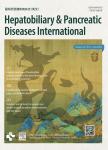Uncoupling protein 2 deficiency reduces proliferative capacity of murine pancreatic stellate cells
Uncoupling protein 2 deficiency reduces proliferative capacity of murine pancreatic stellate cells作者机构:Department of Medicine IIDivision of Gastroen-terologyRostock University Medical CenterE.-Heydemann-Str.618057 RostockGermany
出 版 物:《Hepatobiliary & Pancreatic Diseases International》 (国际肝胆胰疾病杂志(英文版))
年 卷 期:2016年第15卷第6期
页 面:647-654页
核心收录:
学科分类:10[医学]
基 金:supported by a grant from the Bundesministerium für Bildung und Forschung(0315892A GERONTOSYS program)
主 题:pancreatitis proliferation stellate cell biology uncoupling protein 2
摘 要:BACKGROUND: Uncoupling protein 2 (UCP2) has been suggested to inhibit mitochondrial production of reactive oxygen species (ROS) by decreasing the mitochondrial membrane potential. Experimental acute pancreatitis is associated with increased UCP2 expression, whereas UCP2 deficiency retards regeneration of aged mice from acute pancreatitis. Here, we have addressed biological and molecular functions of UCP2 in pancreatic stellate cells (PSCs), which are involved in pancreatic wound repair and fibrogenesis. METHODS: PSCs were isolated from 12 months old (aged) UCP2^-/- mice and animals of the wild-type (WT) strain C57BL/6. Proliferation and cell death were assessed by em- ploying trypan blue staining and a 5-bromo-2'-deoxyuridine incorporation assay. Intracellular fat droplets were visualized by oil red O staining. Levels of mRNA were determined by RT-PCR, while protein expression was analyzed by immunoblotting and immunofluorescence analysis. Intracellular ROS levels were measured with 2',7'-dichlorofluorescin diacetate. Expression of senescence-associated β-galactosidase (SA β-Gal) was used as a surrogate marker of cellular senescence. RESULTS: PSCs derived from UCP2^-/- mice proliferated at a lower rate than cells from WT mice. In agreement with this observation, the UCP2 inhibitor genipin displayed dose- dependent inhibitory effects on WT PSC growth. Interestingly, ROS levels in PSCs did not differ between the two strains, and PSCs derived from UCP2^-/- mice did not senesce faster than those from corresponding WT cells. PSCs from UCP2^-/- mice and WT animals were also indistinguishable with respect to the activation-dependent loss of intracellular fat droplets, expression of the activation marker α-smooth muscle actin, type I collagen and the autocrine/paracrine mediators interleukin-6 and transforming growth factor-I~ 1. CONCLUSIONS: A reduced proliferative capacity of PSC from aged UCP2^-/- mice may contribute to the retarded regeneration after acute pancreatitis.



